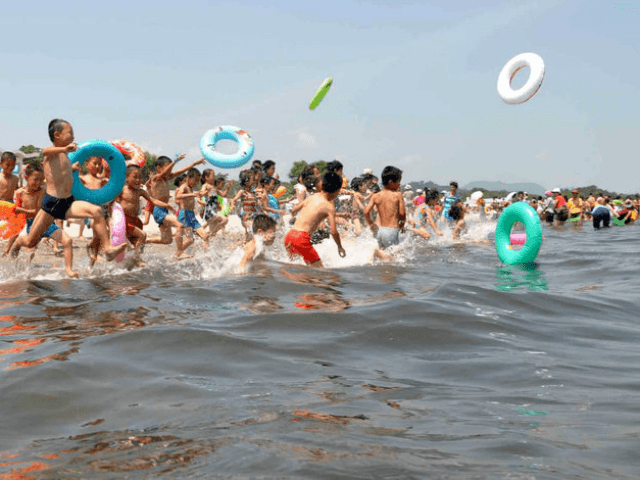North Korea’s state news service, the Korean Central News Agency (KCNA), boasted that its Chinese counterpart Xinhua praised the country’s seaside resort town of Wonsan, applauding the “fresh development” in North Korea’s economy.
“We could know that progress is being made in all fields of the DPRK [Democratic People’s Republic of Korea] on the way to Wonsan, a coastal city of this country,” KCNA relays Xinhua as reporting. “Buildings for the Wonsan-Kalma coastal tourist area under construction have already taken their shapes, and outer design and afforestation and greening are also very unique.”
“The changes occurring in the DPRK are all fresh. … These successes are the epitome of the DPRK today, which shows its fresh looks and robust vitality,” Xinhua reportedly informed Chinese readers.
The English-language Xinhua website did not carry an article on Wonsan or the “fresh” economic development in North Korea. Xinhua has in the past, however, encouraged Chinese tourism to the region.
“Wonsan, facing the Sea of Japan, is known for its beautiful beach scenery,” Xinhua reported in May, announcing that dictator Kim Jong-un had called for “building a world-class beach resort” in Wonsan. This piece, however, was largely a report on KCNA’s coverage of its own country’s development.
This week’s KCNA report is notable because it follows reports in South Korean media that Kim is pressuring Chinese Communist Party leader Xi Jinping to invest in the establishment of a major tourist resort in Wonsan, likely accessible only by approved tourists and individuals belonging to the highest castes of North Korean society. Last month, North Korea forced journalists in the country to cover the alleged shutdown of the Punggye-ri Nuclear Test Site to stay in hotels in Wonsan, requesting flattering coverage of the town.
North Korea’s communist government adheres to a strict caste system known as songbun, which determines where a person lives and whether they have access to luxuries such as food and travel. Those with low songbun are banned from Pyongyang and often relegated to concentration camps. Estimates suggest that as many as 120,000 North Korean citizens live in concentration camps, many born there of families found to have low songbun for their affiliation with religious people or political dissidents.
This week, the South Korean newspaper Dong-A Ilbo reported that Pyongyang is pressuring China to build a “world-class” resort in Wonsan as a condition in accepting to end the country’s illegal nuclear program and its incessant threats to use nuclear bombs to destroy the United States, South Korea, and Japan. The newspaper, citing a diplomatic source, estimated that the planned Wonsan resort could generate up to $50 million in revenue for the communist regime a year.
China itself uses tourism to boost its economy, most recently ending the need for foreign visas to travel to Hainan province in the South China Sea, a tropical getaway uncomfortably close to territories China has militarized for its neighbors, particularly Vietnam and the Philippines. North Korean and Chinese ally Cuba relies significantly on tourism given its location in the Caribbean; the military dictatorship controls tourism businesses on the island. Cuban nationals are forced to use a separate, far less valuable, currency than tourists that blocks them from most tourist destinations, a system human rights advocates have described as “apartheid.”
Several reports indicate that North Korea, while not a tropical country, is seeking to emulate the Chinese and Cuban systems, aided by the longtime implementation of songbun. A report in the Japanese newspaper Mainichi Shimbun published Friday suggested that North Korea is seeking “the removal of all economic, social and political threats” in exchange for denuclearization, according to one expert. The Wonsan “public works project” could be part of conversations between Kim Jong-un and American President Donald Trump when the two meet next week. The North Koreans may have already asked Trump to help build a casino in Wonsan in a meeting last week, some reports claimed.
Secretary of State Mike Pompeo has said that Americans may offer North Korea “economic help” is bilateral talks continue positively. President Trump has asserted that the U.S. taxpayer will not “have to spend” on the North Korea project, leaving the possibility open for private corporations to profit from working with the Kim regime.
Follow Frances Martel on Facebook and Twitter.

COMMENTS
Please let us know if you're having issues with commenting.